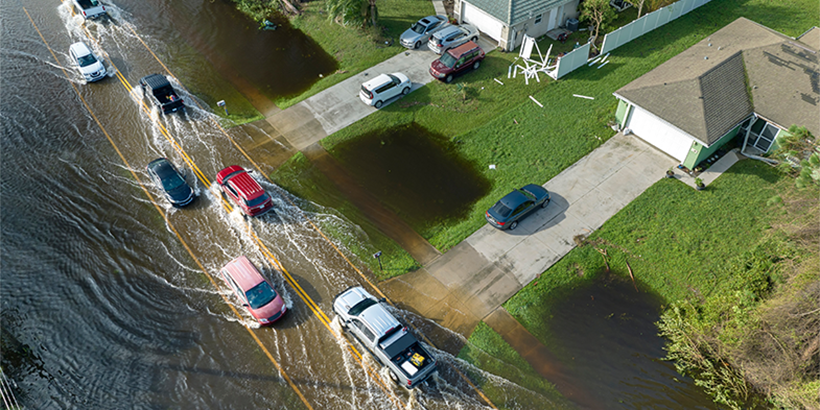Natural disasters can strike at any moment. As a renter, it's essential to take proactive steps to prepare for potential emergencies, including natural disasters such as hurricanes, tornadoes, wildfires, and floods.

It is equally important to know what steps you can take in response to a natural disaster or severe weather event. Follow these tips to protect you, your family and your property.
Understanding Your Disaster Risk
Every region has its own set of disaster risks, and it's important to stay aware of the potential hazards in your area. Whether you live in a coastal region prone to hurricanes, a tornado alley, or an area susceptible to wildfires or floods, understanding your disaster risk is the first step to disaster preparedness.
Take the time to understand common natural disasters in your region and learn how they could affect your living situation. Consider talking to your landlord or local emergency management officials to learn more about specific risks in your area. You can also look at the U.S. Federal Emergency Management Agency (FEMA) website which allows you to search your ZIP code to learn more about active and past disaster declarations and location-specific resources for your area.
If you do not already have renters insurance, you may consider purchasing a policy that can help protect you from damage related to disaster risks in your area.
Preparing for a Natural Disaster
With a better idea of your disaster risk, you can be more proactive in planning and preparing for natural disasters.
Ready.gov recommends starting your preparation by creating a family emergency plan that answers the following questions:
- How will I receive emergency alerts and warnings?
- What is my shelter plan?
- What is my evacuation route?
- What is my family/household communication plan?
- Do I need to update my emergency preparedness kit?
Your emergency plan should prioritize your family’s safety but there are also steps you can take to prepare for any potential impact on your housing situation. Talk to your property manager to learn if there is an emergency plan for your rental property.
It can be helpful to keep copies of your lease agreement, renters insurance, and any other important documents in a waterproof or fireproof covering to avoid damage and ensure they’re readily available if needed.
It is also recommended to create an emergency fund with a goal of saving enough money to cover three to six months of your regular expenses.
Responding to a Natural Disaster
Once you and your loved ones are safe and accounted for, you can turn to assessing any damage to your home or property.
If your rental unit, or property inside the rental unit, suffers damage from a natural disaster, contact your renters insurance company to file a claim. Coverage may vary based on your specific insurance policy, but most will cover damage from tornadoes, fires, hail and non-flood related water damage. Flood insurance is a separate policy and can be valuable even if you are not in a coastal area. If you don’t have renters insurance, reach out to your property manager to assess the impacts and discuss next steps.
If FEMA makes an official disaster declaration in your county, you may be eligible for federal disaster assistance. These funds can be used to cover the costs of relocating while your rental unit is repaired to livable condition, and you can use this money to cover security deposits, rent and the cost of essential utilities. Renters may also qualify for assistance to replace or repair essential property, such as furniture, appliances, clothing, school supplies, tools and vehicles.
You may also qualify for additional federal, state or local government assistance. For instance, if a natural disaster impacts your ability to work, you may be eligible for unemployment benefits.
Recovering from a Natural Disaster
As you recover from any natural disaster, keep an open line of communication with your property manager. Keep them informed of any damage that needs to be repaired. Sharing pictures of the damage may help your property manager make insurance claims, if needed.
Your property manager should also keep you informed of their plans to address damage and their expected timeline. It’s helpful to keep a written record of any communication to ensure everyone is on the same page throughout.
Your lease agreement lays out your options and responsibilities as a renter. After a natural disaster, it can be helpful to review it and familiarize yourself with the following two clauses:
- Rental abatement clause. This part of your lease may allow you to pause or make partial rent payments if your rental unit is damaged.
- Lease termination clause. Most lease agreements include information on how and when a lease can be terminated.
If all or a portion of your rental home is unlivable, these clauses can help you decide how to proceed. If your lease agreement does not include one or both clauses, reach out to your property manager to discuss adjusting your lease.
If you are experiencing financial hardship following a natural disaster and are struggling to make rent payments, you may also talk to your property manager about flexible rent payments.
As you rebuild after a disaster, you may also be eligible for additional programs, including federal tax relief and financial assistance for your energy bills.
Last reviewed: December 29, 2025
My Home in your inbox
Sign up to receive resources, tools and tips about buying, owning, refinancing, selling and renting a home in your inbox.